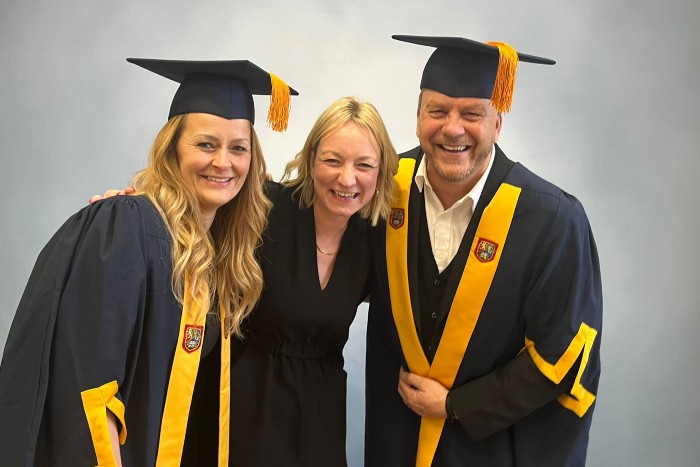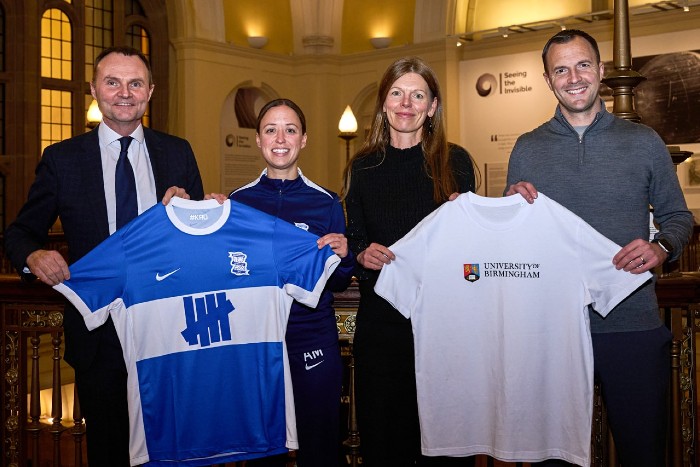The supporters helping to find safer and more effective childhood cancer treatments
 The Little Princess Trust has been inscribed into the history of the University of Birmingham in recognition of the charity’s transformative generosity and commitment to paediatric cancer research at the University.
The Little Princess Trust has been inscribed into the history of the University of Birmingham in recognition of the charity’s transformative generosity and commitment to paediatric cancer research at the University.
The charity provides ‘hair and hope’ to families impacted by childhood cancer. It was co-founded by Simon Tarplee and Wendy Tarplee-Morris in 2005 in memory of their daughter Hannah, who died following a Wilms tumour, with the aim of providing free, real hair wigs to children who have lost their own hair through cancer treatment. As the charity has grown, so too has its mission, to now include the funding of kinder and less toxic treatments for childhood cancers.
The Little Princess Trust has provided £4.5 million in research funding to the University. In recognition the charity was inducted to the Chancellor's Guild of Benefactors, with its name to be inscribed next to the Great Hall in the Aston Webb building.
From Wendy’s kitchen table to the marble of Aston Webb, the charity has grown to have tremendous impact on the lives of thousands of children and young people.
Research at Birmingham supported by the charity includes the exploration of nanomedicine to make chemotherapy safer for children, the PHITT Trial trial which is transforming the treatment landscape for children with liver cancer and the GLOSurgery project which looks at using indocyanine green dye and infrared light to make cancer surgeries safer.
At the induction ceremony, Wendy said: ‘We began the Little Princess Trust as a small memorial charity in our daughter Hannah’s name. On top of helping nearly 18,000 children and young people by providing them with wigs, we are proud to be able to support Birmingham's research, to give more people experiencing cancer hope of less toxic treatments.’
Professor Karl Dearn, Head of the School of Engineering, was Orator during the ceremony. He said: ‘This partnership underscores the Trust's truly transformative impact, not just on the individual lives, but on the broader medical landscape. Their work continues to shine as a source of hope, compassion and determination to make the world kinder, always striving for more and better.’
Strategic alliance formed with iconic Birmingham institution
 The University has formed a strategic alliance with Birmingham City Football Club, around a shared ambition for the city’s success.
The University has formed a strategic alliance with Birmingham City Football Club, around a shared ambition for the city’s success.
This partnership will create opportunities in research, education and health, raise aspirations across Birmingham and enhance the city’s global reputation.
University expertise across data science, physical performance, medicine, coaching, psychology and rehabilitation, will provide opportunities for performance gains from the BCFC Academy to the Women's and Men's First Teams. At the same time, the University community will have access to a local football club, providing internships, job opportunities and entertainment in a truly collaborative way.
Professor Deborah Longworth, Pro-Vice-Chancellor of Education added: “We have a long and proud history of sporting success, from offering the UK’s first sport science degree course in 1946 and research into rehabilitation, physical activity and sport performance, to staff, students and alumni competing at an international level, most recently at the Olympics and Paralympics in Paris last summer. Sport at Birmingham ranks 8th globally in the QS World University Rankings and so this collaboration has huge potential for us, BCFC and the wider Birmingham community.”
On 16 February at a specially designated match to mark the start of the alliance, staff, students, alumni and friends from the University community filled the stands of St Andrew’s Knighthead Park, gathering to watch a home team win. A fitting start for this groundbreaking new partnership.
Find out more about Birmingham City FC owner Knighthead and the company’s plans to invest in the city.
University of Birmingham ranks among world’s best
The University of Birmingham ranks amongst the best performing research-intensive universities in the world – with six areas placing in the Top 50 of the latest QS World University Rankings by Subject.
A further 20 subjects are in the top 100, with disciplines ranging from Medicine to Performing Arts and Chemical Engineering to Sociology (which improved by 24 places to 76th). Life Sciences & Medicine, and Arts & Humanities are also in the top 75.
Dentistry, English, Theology, Anatomy & Physiology, and Linguistics all place in the Top 50, whilst Sport maintains its place in the top 10 globally (8).
The QS World University Rankings are the most used global rankings and are a measure of a university’s global reputation.
Professor Deborah Longworth, Pro-Vice-Chancellor (Education) at the University of Birmingham commented: ‘As the University of Birmingham celebrates its 125th anniversary this year, our students continue to benefit from an outstanding research-intensive education that develops the knowledge, skills and attributes sought after by employers and delivers great career prospects for our graduates.
‘With 26 subject areas in the top 100 – six of which are in the top 50, with sports-related subjects in the top 10 – the rankings recognise Birmingham as a place for leading scientists, professionals and students who want to be involved in world-class research and achieve a degree that will enhance professional opportunities around the world.’
Birmingham rises in list of most international universities
In a list of the world's most international universities published by the THE, the University of Birmingham has risen to number 33 in the world, joint equal with the Massachusetts Institute of Technology.
The THE ranking looks at those universities with the highest share of international students and scholars, that collaborate most with academics from across the world, and have a strong global reputation to match.
Read the full list here: Most international universities in the world 2025 | Student